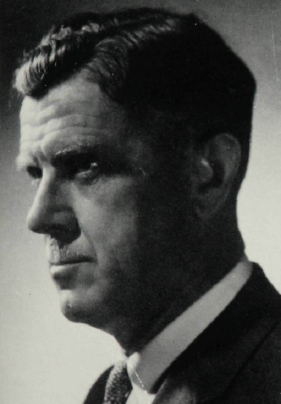<< Back to Lion August 2020
A principal concern
The OWCA office recently received an apologetic email from Michael McCarthy (OW1957) whose grandfatherly duties in Canberra rightly took precedence over last year’s Golden Lions Lunch. Here’s what he wrote.
I was especially sorry to miss the Golden Lions Lunch because we were welcoming our new Principal, Nick Evans (OW1985), son of my old friend and contemporary, Neil Evans (OW1957). Neil once endeared himself to me by calling me ‘our star swot.’ Swots weren’t popular at Wesley in those days, as Robert Menzies had discovered some 40 years earlier. Nick is obviously the right man for the job, and I wish him every success as he writes the next chapter of Wesley’s history.
Speaking of Heads, I have recently rediscovered a book by the Rev Dr A Harold Wood OBE, Principal of MLC from 1939 to 1966, called Not Lost but Gone Before: Memories of 100 Christian men and women. It includes articles on Wilfrid Frederick, Headmaster of Wesley from 1947 to 1956 and Professor of Education at the University of Melbourne from 1957 to 1966; and my mother, Joyce McCarthy, the first Principal of Elsternwick MLC from 1961 to 1972 as an independent school (previously the Fred J Cato Branch of MLC and now the Elsternwick Campus of Wesley).
This article is reproduced here for your reading pleasure.
Wilfrid H FREDERICK
Wilfred Frederick, pictured, was Headmaster of Wesley from 1947 to 1956.
I regarded Wilfrid Frederick as the finest orator in Australia, no politician excepted.

At a Wesley College Speech Night in Melbourne Town Hall in 1953 I once heard RG Menzies as guest speaker. Menzies used his characteristic style of pointed but ponderous speech, with one thought expanded over ten minutes or so. This was in contrast to the brilliant style of Frederick that night. Of course a Headmaster’s Annual Report gave him a special opportunity. However, both then and on other occasions, there was the same mastery of words and phrases, with flashes of scintillating wit. He marshalled facts with the deftness of an expert. I still think that few, if any, have been in his class of natural oratory.
Oratory and wit were the least of his virtues and abilities. He was a convinced Christian ready to defend the faith as he believed it, in any company such as the Common Room at University High School when he met colleagues who did not accept the Christian religion. Frederick was especially noted as a teacher of French after a highly successful course of study at the Sorbonne.
Frederick was a brilliant headmaster of Wesley College, and perhaps an even more effective Professor of Education. He adorned every position he occupied with his gracious and sincere personality, always interested in people and always approachable.
He was also an inter-State tennis player and, almost to the end of his life, played a few sets each week. It was characteristic of his unselfish attitude that he encouraged relief work for the underprivileged. Among his educational reforms was the establishment of the study camp of Wesley College classes at Chum Creek Forestry Camp where the boys combined country activities with their normal studies.
I was a member of the committee which interviewed Frederick when he had applied for the vacant headmastership of Wesley College. Frederick openly stated his preference for social service training of secondary school students over the cadet corps. One of the committee was a wealthy man who thought that capitalism ought to be supported by militarism at every level. Afterwards the wealthy man said that he thought Frederick’s preference militated against his appointment; I begged strongly to differ. After the committee Dr Calvert Barber, then chairman of the Council, suggested that we should make the postponed consideration of the appointment a matter of prayer. I said that others might pray but I had my answer already and had no need to pray on the subject. I found afterwards that my words almost ‘upset the applecart’, but Frederick was chosen Headmaster.
After the rather harsh rigidity of the McNeil regime his successor brought a relief to Wesley College. Some may have thought the change went almost too far. However, there was a much more human and friendly atmosphere. Frederick enjoyed everything - the school songs, his own messages in daily assembly, the whole life of Wesley. As he had indicated, social service [or as Frederick called it, community service] in work was emphasised.
Whereas McNeil, no doubt for reasons of study and discipline, had warned boys against asking for excuse from attending school on a public holiday, Frederick even applauded the request of a boy wishing to attend a church camp over the Queen’s birthday weekend and willingly gave permission to be absent from school.
His irrepressible wit was likely to break out at any time. At a Wesley Old Boys dinner in Melbourne Town Hall he suddenly passed along the table his latest limerick.
‘When Menzies was followed by Holt,
Scotch and Grammar received quite a jolt;
There’s only one College
For ‘Liberal’ knowledge –
Hurrah for the purple and golt!’
I heard Professor Frederick give a valedictory lecture at the University on his retirement from his position as Dean of the Faculty of Education. He concluded with the witticism, ‘Old Deans never die, they only lose their Faculties’!
He loved singing – and hymns. One of the hymns sung at his funeral was chosen, I believe, by him. It certainly revealed both his habitual devoutness and his appreciation of stately words. It began ‘O Lord, enlarge our scanty thought to know the wonders Thou hast wrought..’ John Wesley’s translation of a German hymn (Methodist Hymn Book 449).